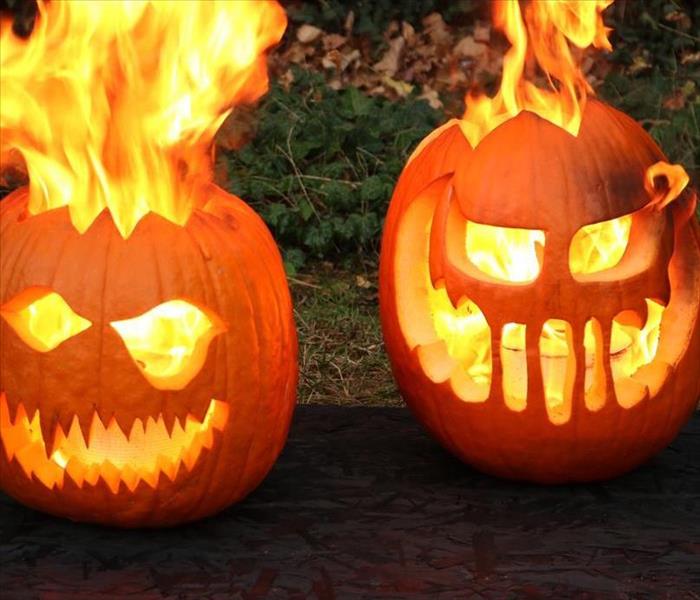Archived Fire Damage Blog Posts
Prevent a Fire Damage After the Holidays
12/28/2021 (Permalink)
SERVPRO of Atascadero/ Paso Robles caution homeowners to take common sense precautions throughout the holiday season in Atascadero, CA. Most homeowners are aware holiday decorations should be used with care. Each year, statistics tell the story of the fire danger resulting from frayed wires, proximity to heat sources, and lights left on unattended. SERVPRO of Atascadero/ Paso Robles wants local homeowners to know that the danger of fire caused by holiday decorating, and by Christmas trees specifically, increases after the holiday. Citing research from the National Fire Protection Association (NFPA)*, while four out of five Christmas tree fires happen in December and January, the 10 days with the highest average number of fires were all after Christmas Day.
SERVPRO of Atascadero/ Paso Robles encourages homeowners who choose to decorate with live Christmas trees to be diligent about watering their trees both before and after the holidays. “When a Christmas tree dries out, it takes only a single spark from the fireplace, a draft that blows a candle flame too near, or a carelessly held cigarette to turn your holiday celebration into a tragedy.”
Choosing SERVPRO of Atascadero/ Paso Robles for your Fire Damage
12/28/2021 (Permalink)
When disasters impact your Atascadero/ Paso Robles Property, not just anyone can fix it to the high standards that you can expect from professional restoration. While our franchise strives to offer each customer that we serve an experience that goes above and beyond their expectations, not every restoration company in our service area can provide that for you. There are important elements that set our team apart regarding fire restoration and recovery, and it begins by providing our clients with experienced and professional technicians. Each of our technicians that come out for fire restoration work has undergone extensive training to obtain their Fire and Smoke Restoration certification through the IICRC. This organization sets the standard for high-quality restoration work to get performed on residential properties, but this is only the beginning to the educational opportunities and ongoing in-house training regiments that exist to make our technicians elite in the field. This training extends beyond our ability to manage the damaged elements of your property and begin restoration practices. Our SERVPRO of Atascadero/ Paso Robles technicians can also keep an open line of communication with our customers and their insurance companies to meet the needs of the other parties while we return your home to its original condition.
Fire Safety Tips During Holiday Barbeque Events
11/22/2021 (Permalink)
Summer and fall brings family and friends together for good times over the barbecue. Great food and great company make great memories and the professionals from SERVPRO of Atascadero/Paso Robles want to make sure those memories are not marred by an out-of-control fire.
People getting together for a good time hardly seems like something that can turn into a disaster, but these interesting facts from the National Fire Protection Association can make people much more aware of barbecue safety:
A few precautions and a watchful eye can help keep flames and hot coals in the barbecue and away from guests, pets, dry vegetation, and other flammable surroundings. Here are some tips to help prevent a fire.
- Always check the tank and connections for gas grills before starting.
- Set up the grill in a clear area outside away from flammable materials, including dry grass, trees, umbrellas, and covered patios.
- Allow plenty of room for people to move around, reducing accidental contact with the hot barbecue, or even tipping it over.
- Don’t allow children and pets to play too close.
- Keep a fire extinguisher handy. A fire extinguisher can be used with gas or charcoal/wood grills. A water hose can be used with charcoal or wood grills.
- Trim excess fat. Meat that is too fatty causes flames to flare and can cause serious injury. Keep a spray bottle handy to stop flare-ups.
- Never leave fire or hot coals unattended.
- Keep the grill clean, including the cooking surfaces and grill pans.
- Check the barbecue for rust spots or holes. Make sure it is well supported with no danger of being easily knocked over. Don’t use damaged equipment.
- Let the barbecue cool down completely before covering it.
- Dump the ashes into a metal bucket and hose them down until there are completely cool with no embers of smoke before disposing of them.
Tips to reduce the risk of a fire
11/11/2021 (Permalink)
As temperatures rise, especially in dry, warm climates such as Atascadero/ Paso Robles Area, fire risk increases as well. Entire communities need to work together, especially those in fire-dependent ecosystems, creating fire-wise solutions that will help to prevent fires from happening, and to ensure that when they do, that fire fighters can effectively extinguish them.
Follow these tips to help reduce the risk of fire, and when fire does occur, that it is possible for firefighters effectively combat them.
Check smoke detectors
Working smoke detectors can save lives. What may start as a small kitchen fire can quickly spread. Make sure to keep smoke detectors fully charged and operational.
Create a firebreak around your home
A firebreak is a gap in vegetation that will stop or slow the spread of a wildfire. Having flammable vegetation directly surrounding a home will make it extremely difficult for fire fighters to save it.
- a) Maximum height of 4 inches
b) Located within 100 feet of any building or structure, or to the property line, whichever is nearer
c) Located within 50 feet from the edge of any improved roadway
d) Located within 50 feet from each property line
e) Located within 10 feet on each side of driveways
Fire wise landscaping
Replacing plants that are prone to fire with plants that are more fire resistant can dramatically reduce the risk of fire around a home. Some fantastic fire-resistant plant options include: all species of ice plant, wild strawberry, carnations, and all succulents. In general, look for moist, supple leaves, and plants with little sap production. Keep in mind that fire resistant plants can still ignite, but they can reduce the risk of fire and make it easier for firefighters to access the home during the event of a fire
What is Fire? How does it spread?
11/11/2021 (Permalink)
SERVPRO of Atascadero/ Paso Robles explains what fire is, how it spreads, and how to prevent it from making a tragedy of a treasured home.
What is fire?
Fire is a chemical process requiring three essential factors: Oxygen, fuel, and an ignition source. Without these three components, a fire cannot start or will immediately extinguish. When a fire burns, a process called oxidation occurs, wherein oxygen atoms combine with carbon and hydrogen to form carbon dioxide and water; heat and energy is released very quickly. The rate of oxidation is particularly fast with paper and wood, and when heat can’t be released faster than it occurs it creates the phenomena known as fire.
How does it spread?
Once started, a fire is likely to spread until all fuel feeding it has been used to the point of extinction. This could mean devastation for a beloved home or business property. However, understanding the many fuels can assist in preventing the spreading.
Chemicals and combustibles – Lab chemicals, household cleaners, paint, and other such chemicals all cause fire to burn hotter and more aggressively. Common household combustibles include mattresses, newspapers, and various fabrics.
Closed space – Closed spaces will burn up much faster than open space. It will trap the flames and only result in further smoke damage, not to mention creating a tough time for fire fighters trying to eliminate the flame.
Ventilation – Buildings with central heating or air conditioning have ductwork which creates a pathway for smoke and flames to travel between floors.
Water – In some cases, such as grease fires, water will not extinguish the fire, but will help spread it. In this case, a special fire extinguisher or baking soda is best to put out the flame.
Tips for Fourth of July!
5/19/2021 (Permalink)
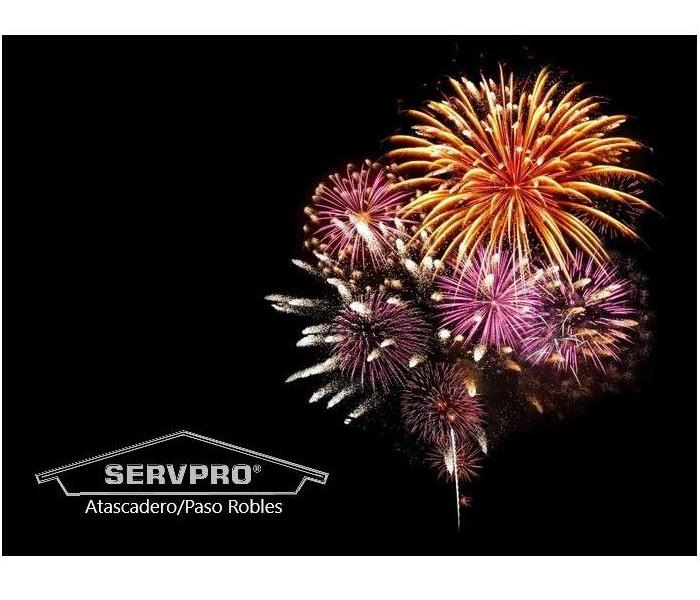 Fourth of July Safety Tips
Fourth of July Safety Tips
It is hard to believe that July is around the corner already. That means that fourth of July is coming up to celebrate Independence Day having barbeques and fireworks with the family. We must be cautions when we deal with fireworks campfires and barbeques because they could cause a house fire or someone getting hurt with a firework.
Here are some tips according to FEMA that can help you out this upcoming holiday:
• Build Campfires at least 25 ft away from tents, shrubs, and anything that can burn
• If you want to see a large firework show, go to a public show, put on by experts.
• Never allow young children to handle fireworks or sparklers.
• Always keep a portable fire extinguisher close by. Also keep a water hose or buckets or water to soak small fireworks before disposing them.
• Use fire pits outdoors only and at least 10 feet away from your home or anything that can burn.
• Use propane, charcoal, and wood pellet barbecue grills outdoors only.
• Place you grill far away from siding and deck railings and out from under eaves and overhanging branches.
Fire Damage Do's and Don'ts
12/1/2020 (Permalink)
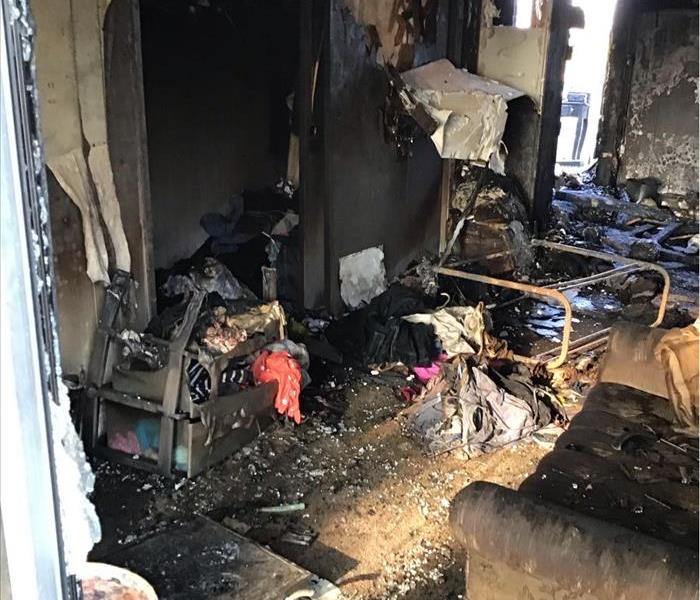 Fire Damage
Fire Damage
When homeowners or commercial property owners deal with a fire in their home or business it can be overwhelming event. It’s crucial, though, to start your fire damage cleanup and restoration process as soon as possible, to get your life back to normal.
Rather than running to the store to buy cleaning products, mops, and buckets yourself, you need to rely on the experts to handle the situation. There are specific steps the professionals will follow to restore your property and contents to their preloss condition.
Here are some do's and don'ts that we suggest:
Do's
- Even if everything looks safe and clear to you, don’t enter your property after a fire until a professional has told you it’s safe to do so. Not only could your structure be unstable, but fires can start again — even after they appear to be out.
- Take photos for evidence of the fire damage this will help when it comes to dealing with your insurance company.
- Call your insurance, in order to get the ball rolling on fire damage assessment.
- Call your local restoration company, to help with fire damage cleanup and repair.
- Limit movement inside the building, this will stop soot particles from spreading.
- If the weather allows, open windows and doors for ventilation.
- Remove all clothing from the property and have it cleaned by professional fire damage restoration cleaners, not just a dry cleaner.
Don’ts
- Enter the building before the fire department gives you the go-ahead, even if it looks safe.
- Start to clean or wipe residue from walls, ceilings, and other surfaces. Everything needs to be assessed by your insurer first.
- Use or try to clean carpets or furnishings impacted by smoke residues or debris until they are professionally cleaned.
- Use food items or canned goods that were exposed to heat or fire.
- Turn on the water, electric, or gas until professionally checked
If it’s not handled correctly the residue left behind after fire damage may cause health problems . Only trained experts with professional equipment can ensure fire damage restoration is done safely and thoroughly.
The Cost to Rebuild your House
4/27/2020 (Permalink)
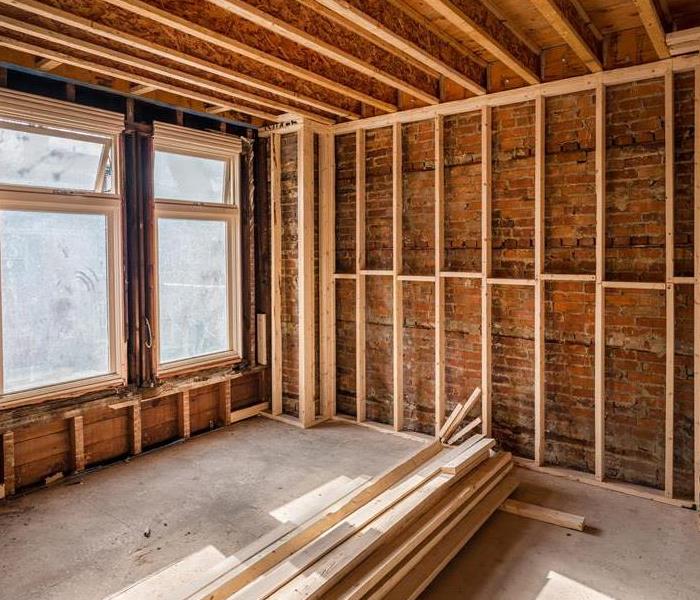 Rebuilding your House
Rebuilding your House
Determining your home's estimated replacement cost is important because in the event of a loss the replacement cost will ultimately determine how much coverage your policy will provide. Since it is impossible to predict today what the exact cost will be to replace your home in the future, it's important to have enough coverage to account for unforeseen circumstances.
1. Ask if a replacement cost estimate is available when you have your home appraised.
2 Consult with your local builder association or a reputable builder for an estimate.
Market conditions in your area may impact the amount it will cost to rebuild your home if you experience a loss. Replacement cost estimates are influenced by factors such as supply of labor, the cost of labor, and the cost of construction materials.
Should you experience a fire, water, or mold loss, you can count on SERVPRO of Atascadero to help. Our goal is to help you regain control and make your damage "Like it never even happened."
Is your Chimney at risk?
4/27/2020 (Permalink)
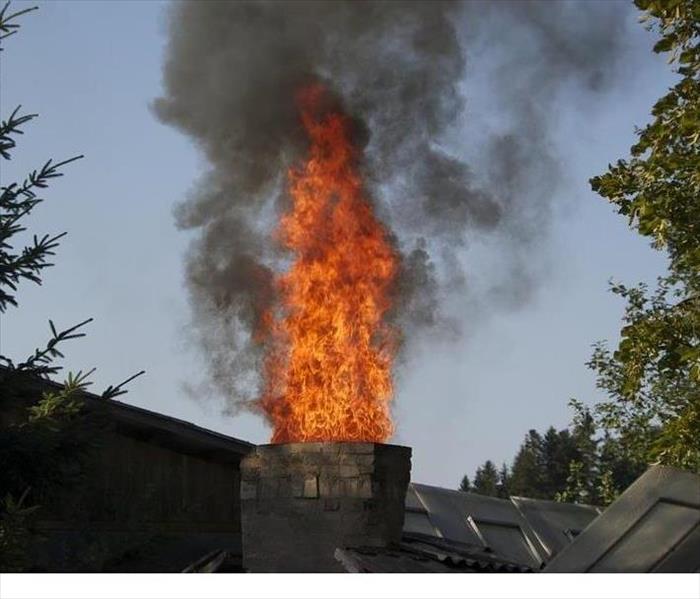 Chimney Fire
Chimney Fire
This is a scenario that plays out almost 25,000 times per year in the US: Chimney Fires. These fires can be very dramatic, or they may burn silently, but their silence holds no indication of the harm they may cause as they burn slowly at incredibly high temperatures. Regardless of the type, all chimney fires can cause substantial damage and risk to you and your family.
So what causes chimney fires? The build-up of creosote along the chimney lining walls can facilitate the start of a chimney fire. This build-up is caused by the unburden materials in the smoke accumulating along the chimney walls and creating a sticky substance that can easily catch fire. The smoke from the fire contains a substance similar to tar and when the temperatures within the chimney are below 250 degrees Fahrenheit, the substance will condense along the chimney surface. When the temperature drops below 150 degrees Fahrenheit, the substance turns into a dark, sticky substance that is also highly flammable.
Tips on how to prevent from using a fire extinguisher
4/27/2020 (Permalink)
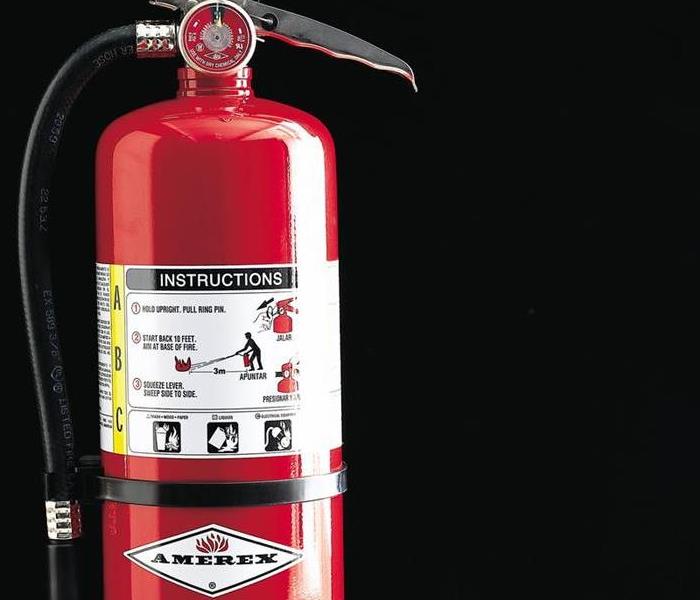 Fire Extinguisher
Fire Extinguisher
Make sure kids and pets stay away from hot food or liquids. The steam or splash from vegetables, gravy, or coffee can cause serious burns.
Keep the floor clean so you don’t trip over any toys, purses, or bags.
Keep knives out of the reach of children.
Be sure electric cords from an electric knife, coffee maker, plate warmer, or mixer are not dangling off the counter within easy reach of a child.
Do not leave candles burning in rooms where you cannot observe them and make sure the flame is at least 1’ away from any combustible item.
Make sure your smoke alarms are working. Test them by pushing the test button.
Tests have shown that a number of available fryers can tip over easily, allowing hot oil to spill and creating a fire or scald burn from contact. They can also overheat which causes hot oil to spill or splatter outside the fryer, a recipe for fire or serious injury.
How to get rid of bad odor after a fire damage.
4/27/2020 (Permalink)
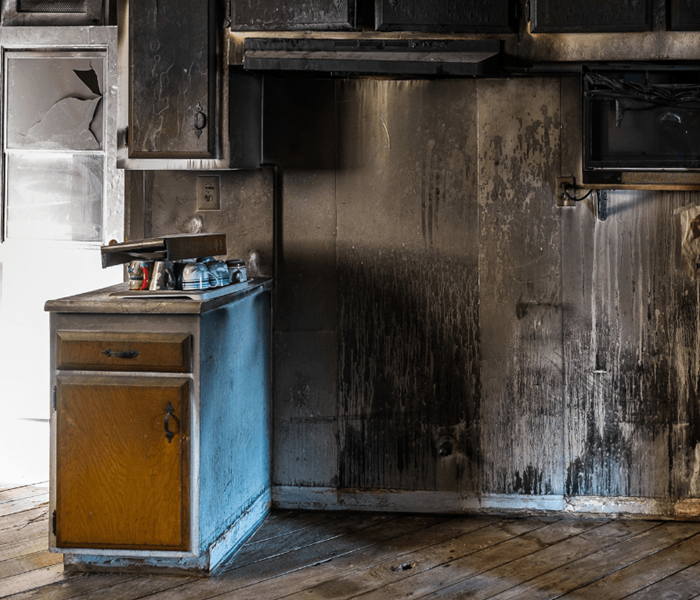 Kitchen filled with soot
Kitchen filled with soot
One of the most significant issues after a fire is not the loss of possessions, but the lingering bad odor left afterward. It can be very challenging to remove smoke smells, often requiring the assistance of professionals who understand what to do when smoke odors do not go away.
What are the steps SERVPRO technicians put into place to remove the smells in a fire damaged house?
- Remove: We find and remove all sources of smoke, taking anything charred offsite for cleaning and restoration when possible, and disposing if damaged items.
- Clean: We use dry cleaning for residue not yet absorbed and wet cleaning with solvents for absorbed residue requiring a deeper clean.
- Neutralize: When the smells still linger after removal and cleaning, we use odor-absorbing beads and then thermal foggers which produce a smoke-like substance reaching throughout the home, attacking hard to reach smoke particles
For 24/7 assistance after a fire, contact SERVPRO of Atascadero at (805)541-1271.
Tips on how to prevent a Halloween Fire
10/11/2019 (Permalink)
A fire can start when candles are too close to decorations or when long trailing costumes touch any lit candles. To make sure you have a spooky and safe Halloween, follow these tips from the National Fire Protection Association (NFPA):
• When choosing a costume, stay away from long trailing fabric. If your child is wearing a mask, make sure the eye holes are large enough so he or she can see out.
• Keep all decorations away from open flames and other heat sources like light bulbs and heaters.
• Use a battery-operated candle or glow-stick in jack-o-lanterns.
• Remember to keep exits clear of decorations, so nothing blocks escape routes.
• If your children are going to Halloween parties at others’ homes, have them look for ways out of the home and plan how they would get out in an emergency.
Disaster Response Professionals Offer Fire Prevention Safety Tips
10/4/2018 (Permalink)
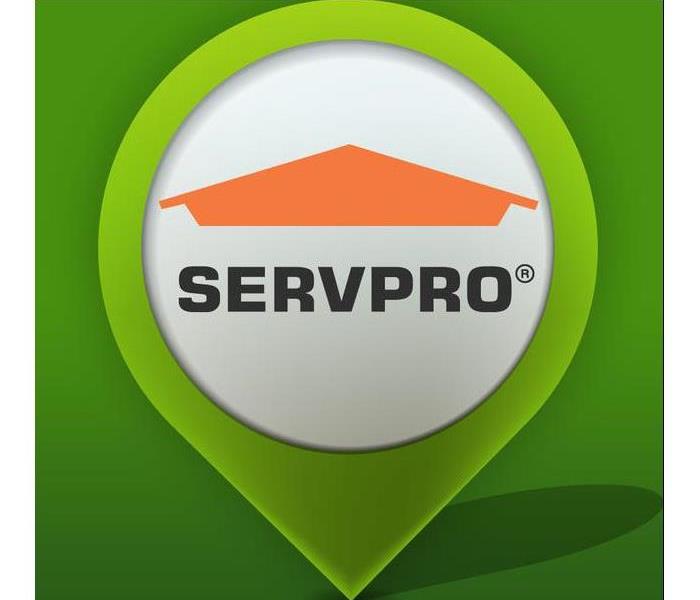 Have a SAFE holiday season!
Have a SAFE holiday season!
Local Disaster Response Professional Says Keep the Focus on Fire Prevention for a Safe and Joyous Holiday Season SERVPRO® restoration specialist outlines holiday home fire prevention guidelines.
San Luis Obispo, CA (Grassroots Newswire) November 29, 2017 --
The American Red Cross (ARC) cites statistics from the U.S. Fire Administration1 showing nearly 47,000 fires occur during the winter holidays, claiming more than 500 lives, causing more than 2,200 injuries, and costing $554 million in property damage. Joseph Powers of SERVPRO® of San Luis Obispo cautions home owners to follow some important ARC guidelines for holiday decorating and entertaining to make sure that the glow in their holiday celebrations is from twinkling lights and not a costly and potentially deadly fire.
Place Christmas trees and other holiday decorations at least three feet away from heat sources like fireplaces, portable heaters, radiators, heat vents, and candles.
Purchase flame-retardant metallic or artificial trees. If you purchase a real tree, make sure that it has fresh, green needles that aren't easily broken. Keep live trees as moist as possible by giving them plenty of water.
Make sure that light strings and other holiday decorations are in good condition. Do not use anything with frayed electrical cords and always follow the manufacturer's instructions.
If you are celebrating Hanukkah or Kwanzaa, keep flammable items, including curtains and holiday decorations, at least three feet away from your candles. Place your menorah or kinara on a non-flammable surface, such as a tray lined with aluminum foil, to catch the melting candle wax. Never leave lit candles unattended.
Ensure all candles and smoking materials are properly extinguished after guests leave and always unplug tree and holiday lights before leaving home or going to bed.
If, in spite of all your precautions, a fire does break out, the most important thing you can do to help save lives is to install and maintain smoke alarms throughout your property, says Powers. Having a working smoke alarm reduces everyone's chances of dying in a fire by nearly half.
Powers notes that the ARC is joining with fire departments and community groups nationwide to deliver and install a limited number of free smoke alarms in homes for those in need. Contact your local ARC chapter for more information.
The disaster response professionals at SERVPRO, a leader and provider of fire and water cleanup and restoration services, witness the devastation that home fires can cause far too often.
They also know that when fire causes a loss of life, there is no remediation possible. To keep the focus on fire prevention, rather than fire restoration, SERVPRO has teamed up with the American Red Cross by supporting the ARC Disaster Responder program, and in particular the Home Fire Preparedness Campaign.
As a Disaster Responder, SERVPRO pledges dollars and support in advance to help the ARC develop and distribute educational materials and respond immediately when they are needed.
As a SERVPRO professional, I know that even the most diligent fire prevention planning can't prevent all home fires. That's why fire safety planning, like installing and maintaining smoke detectors and having a family escape plan, is also important, says Powers. If a fire does break out in your home this holiday season, make sure all your family members follow this life-saving advice from the ARC: Get Out, Stay Out, and Call for Help.
For more fire prevention and fire safety tips and information about fire and water damage restoration services, please visit www.SERVPRO.com. For more information on SERVPRO® of San Luis Obispo, please contact Joseph Powers at (805) 541-1271 or office@SERVPROsanluisobispo.com.
http://www.redcross.org/images/MEDIA_CustomProductCatalog/m4340080_FireHolidayFactSheet.pdf
https://www.redcross.org/sound-the-alarm
http://www.redcross.org/get-help/how-to-prepare-for-emergencies/types-of-emergencies/fire/prevent-home-fire#Our-Partners
http://www.redcross.org/get-help/prepare-for-emergencies/types-of-emergencies/fire/home-fire-preparedness
http://www.redcross.org/get-help/how-to-prepare-for-emergencies/types-of-emergencies/fire
Let's Talk Turkey: The Dangers of Deep Frying
10/4/2018 (Permalink)
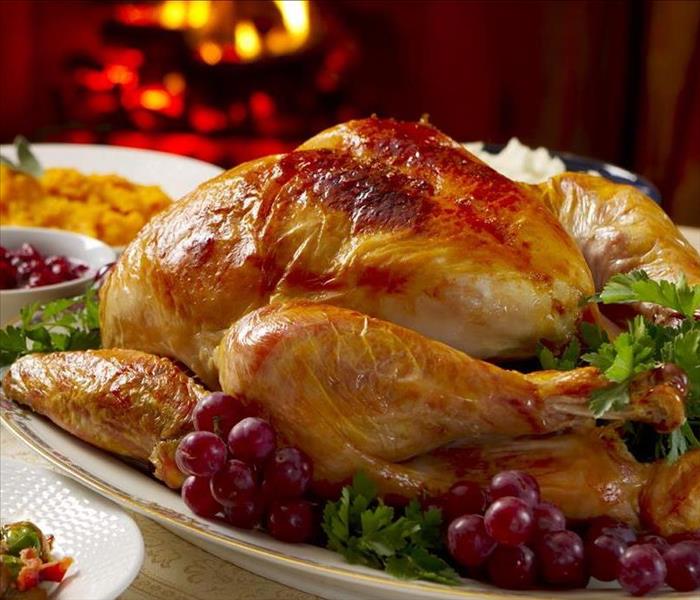 SERVPRO of Atascadero wishes you & yours a very happy Thanksgiving!
SERVPRO of Atascadero wishes you & yours a very happy Thanksgiving!
With Thanksgiving just around the corner, it’s time to talk turkey. Particularly, deep-fried turkey. If you’ve ever had it, you know how good it tastes. If you haven’t, well, you haven’t lived. Not only is it much faster to cook, but the flavor & moisture that results is amazing! BUT, there is some risk to preparing your bird this way, namely FIRE. The only thing faster than deep frying a turkey is how fast your holiday can be ruined if a fire results at your home. SERVPRO of Atascadero has a few tips to prevent that from happening:
- Make sure the turkey isn't frozen—in fact, make sure that the turkey is COMPLETELY thawed. Oil and water do not mix. Dropping an unthawed turkey in hot oil can cause flames to ignite and spread through your home and property.
- Do NOT stuff the turkey before deep-frying or use any water-based marinades when deep-frying.
- Keep the frying at a distance—at least 10 feet away from the house, not inside any enclosures like a garage or a shed, and not under a porch or eaves.
- Keep a close watch on the deep-fryer. It only takes a moment of inattention to end up with fire damage, smoke damage, and/or even water damage if the Fire Department has to show up with their hoses!
- Keep children away from the deep-fryer. Oil burns are especially dangerous.
We at SERVPRO hope these tips help you enjoy a safe, disaster-free Thanksgiving and holiday season. Although restoration after water damage, smoke damage and fire disasters may be our specialty, we don’t wish them upon anyone. But if they occur, SERVPRO is ready for whatever happens, 24/7. Call us anytime at 805-541-1271.
Avoid Disaster! SERVPRO Offers Fire Safety Tips for Your BBQ Grilling
10/4/2018 (Permalink)
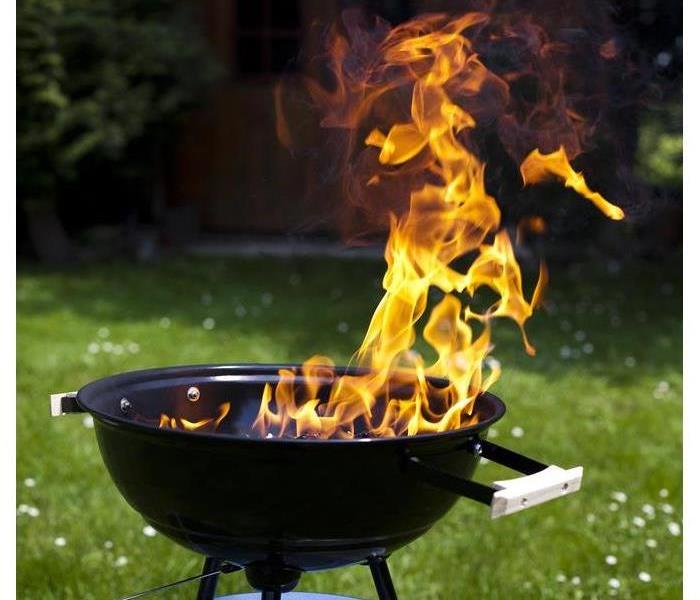 Always Use Safe Practices When Grilling!
Always Use Safe Practices When Grilling!
Everyone loves a good BBQ. Keep in mind that a grill can be a fire hazard. They can be very hot, causing burn injuries. Placed too close to other flammable objects, they can become an ignition source resulting in a deck or house fire or wildfire. Follow these simple tips and you will be on the way to safe grilling.
SAFETY TIPS
- Only use propane and charcoal BBQ grills outdoors.
- Place the grill well away from the home, deck railings and out from under eaves and overhanging branches.
- Children and pets should be kept at least three feet away from the grill.
- Your grill should be kept clean by removing grease or fat buildup from the grills and in trays below the grill.
- Never leave a grill unattended—they can flare up in an instant.
- Before lighting it, always make sure your gas grill lid is open.
CHARCOAL GRILLS
- There are several ways to prepare the charcoal. Charcoal chimney starters allow you to start the charcoal using newspaper as a fuel.
- If you use a starter fluid, use only charcoal starter fluid. Never add charcoal fluid or any other flammable liquids directly to the fire. Do not EVER use gasoline.
- There are also electric charcoal starters, which do not use fire. Be sure to use an extension cord that is rated for outdoor use.
- When you are finished grilling, let the coals completely cool before disposal—always dispose of them in a metal container.
- Keep charcoal fluid away from heat sources an out of the reach of children.
PROPANE GRILLS
- Before using it for the first time each year, always check the gas tank hose for leaks. Apply a light soap and water solution to the hose. A propane leak will release bubbles. If you can smell gas, and/or if the “soapy bubble test” is actively releasing bubbles, your grill has a gas leak. If there is no flame, turn off both the gas tank and the grill. If the leak stops, get the grill serviced by a professional before using it again. If the leak does not stop, clear the area and call the fire department. If you smell gas while cooking, immediately get away from the grill and call the fire department. Do not move the grill.
- If the flame goes out, turn the grill and gas off and wait at least 5 minutes before re-lighting it.
All of us at SERVPRO of Atascadero hope these tips help you enjoy a safe, disaster-free summer and beyond. Restoration after smoke, fire and water disasters may be our specialty, but we don’t wish them upon anyone. But if they occur, SERVPRO is ready for whatever happens, 24/7.
Autumn is Upon Us! Here are a Few Important Tips from SERVPRO:
10/3/2018 (Permalink)
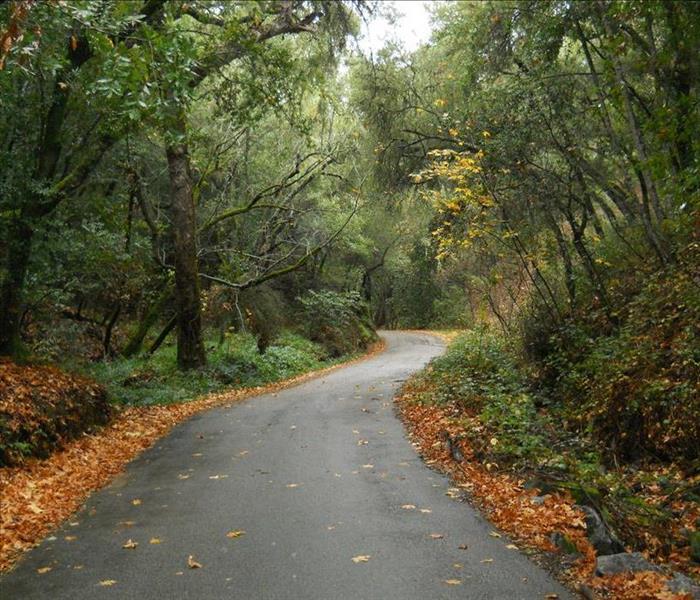 Autumn brings with it many changes--make sure you're ready.
Autumn brings with it many changes--make sure you're ready.
As cooler fall weather moves in, SERVPRO of Atascadero reminds you to keep electrical safety in mind. Here are a few safety tips to help you stay safe as things cool down:
- Safely store warm weather tools like lawn mowers and trimmers. BE CAREFUL not to park a lawn mower or other motorized tool with a hot engine near fallen leaves as they may ignite, causing a fire.
- ALWAYS check cold weather tools, such as leaf and snow blowers, along with their power cords, for unusual wear and tear. Repair or replace worn tools or parts right away.
- ALWAYS unplug and safely store battery chargers when not in use.
- Use ONLY weatherproof electrical devices for outside activities. Protect outdoor electrical devices from moisture.
- Keep dry leaves swept AWAY from outdoor lighting, outlets and power cords.
- Make sure electric blankets are in good repair. Power cords should not be frayed, cracked or cut. If you see ANY visible damage to an electric blanket, it should be properly disposed of immediately.
- NEVER tuck an electric blanket under mattresses or children, and NEVER put anything, on top of an electric blanket while it is in use. This includes other blankets and/or comforters/bedspreads.
- The same advice re electric blankets can be said for heating pads. Heating pads and electric blankets cause almost 500 fires each year. Almost all of these fires involve electric blankets that are more than ten years old.
We at SERVPRO hope these tips help you enjoy a safe, disaster-free Autumn and beyond. Restoration after smoke, fire and water disasters may be our specialty, but we don’t wish them upon anyone. But if they occur, SERVPRO is ready for whatever happens, 24/7.






 24/7 Emergency Service
24/7 Emergency Service





